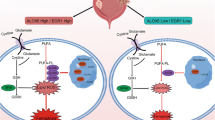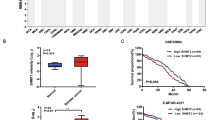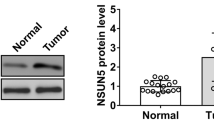Abstract
Recent evidence have indicated that ferroptosis, a novel iron-dependent form of non-apoptotic cell death, plays a critical role in human cancers. Besides, emerging literatures have revealed the ovel function of N6-methyladenosine (m6A) in bladder cancer physiological. However, the underlying mechanism of m6A on bladder cancer is still unclear. Here, present work revealed that m6A methyltransferase (‘writer’) WTAP up-regulated in bladder cancer tissue and cells, indicating the poor prognosis of bladder cancer patients. Functionally, gain/loss-of-functional experiments illustrated that WTAP promoted the viability of bladder cancer cells and inhibited the erastin-induced ferroptosis. Mechanistically, there was a remarkable m6A modification site on 3’-UTR of endogenous antioxidant factor NRF2 RNA and WTAP could install its methylation. Moreover, m6A reader YTHDF1 recognized the m6A site on NRF2 mRNA and enhanced its mRNA stability. Therefore, these findings demonstrated potential therapeutic strategyies for bladder cancer via m6A-dependent manner.






Similar content being viewed by others
Data Availability
Not Applicable.
References
Dobruch J, Daneshmand S, Fisch M, Lotan Y, Noon AP, Resnick MJ et al (2016) Gender and bladder Cancer: a collaborative review of etiology, Biology, and outcomes. Eur Urol 69:300–310
Dobruch J, Oszczudłowski M (2021) ; 57
Lenis AT, Lec PM, Chamie K, Mshs MD (2020) Bladder Cancer: A Review Jama 324:1980–1991
Martinez Rodriguez RH, Buisan Rueda O, Ibarz L (2017) Bladder cancer: Present and future. Med Clin 149:449–455
Ng K, Stenzl A, Sharma A, Vasdev N (2021) Urinary biomarkers in bladder cancer: a review of the current landscape and future directions. Urol Oncol 39:41–51
Siracusano S, Rizzetto R, Porcaro AB (2020) Bladder cancer genomics Urologia 87:49–56
An Y, Duan H (2022) The role of m6A RNA methylation in cancer metabolism. Mol Cancer 21:14
Cai X, Liang C, Zhang M, Xu Y, Weng Y, Li X et al (2022) N6-methyladenosine modification and metabolic reprogramming of digestive system malignancies. Cancer Lett 544:215815
Chang H, Yang J, Wang Q, Zhao J, Zhu R (2022) Role of N6-methyladenosine modification in pathogenesis of ischemic stroke. Expert Rev Mol Diagn 22:295–303
Deng LJ, Deng WQ, Fan SR, Chen MF, Qi M, Lyu WY et al (2022) m6A modification: recent advances, anticancer targeted drug discovery and beyond. Mol Cancer 21:52
Liu L, Li H, Hu D, Wang Y, Shao W, Zhong J et al (2022) Insights into N6-methyladenosine and programmed cell death in cancer. Mol Cancer 21:32
Zhang N, Ding C, Zuo Y, Peng Y, Zuo L (2022) N6-methyladenosine and neurological Diseases. Mol Neurobiol 59:1925–1937
Chen X, Li J, Kang R, Klionsky DJ, Tang D (2021) Ferroptosis: machinery and regulation. Autophagy 17:2054–2081
Li J, Cao F, Yin HL, Huang ZJ, Lin ZT, Mao N et al (2020) Ferroptosis: past, present and future. Cell Death Dis 11:88
Mou Y, Wang J, Wu J, He D, Zhang C, Duan C et al (2019) Ferroptosis, a new form of cell death: opportunities and challenges in cancer. J Hematol Oncol 12:34
Tang D, Chen X, Kang R, Kroemer G (2021) Ferroptosis: molecular mechanisms and health implications. Cell Res 31:107–125
Tang R, Xu J, Zhang B, Liu J, Liang C, Hua J et al (2020) Ferroptosis, necroptosis, and pyroptosis in anticancer immunity. J Hematol Oncol 13:110
Zhou G, Yan K, Liu J, Gao L, Jiang X, Fan Y (2021) FTO promotes tumour proliferation in bladder cancer via the FTO/miR-576/CDK6 axis in an m6A-dependent manner. Cell death discovery 7:329
Yang D, Chang S, Li F, Ma M, Yang J, Lv X et al (2021) M(6) a transferase KIAA1429-stabilized LINC00958 accelerates gastric cancer aerobic glycolysis through targeting GLUT1. IUBMB Life 73:1325–1333
Zhou Y, Pei Z, Maimaiti A, Zheng L, Zhu Z, Tian M et al (2022) M(6)a methyltransferase KIAA1429 acts as an oncogenic factor in colorectal cancer by regulating SIRT1 in an m(6)A-dependent manner. Cell death discovery 8:83
Zhang X, Dai XY, Qian JY, Xu F, Wang ZW, Xia T et al (2022) SMC1A regulated by KIAA1429 in m6A-independent manner promotes EMT progress in breast cancer. Mol therapy Nucleic acids 27:133–146
Yi K, Liu J, Rong Y, Wang C, Tang X, Zhang X et al (2021) Biological Functions and Prognostic Value of Ferroptosis-Related genes in bladder Cancer. Front Mol Biosci 8:631152
Sun Y, Berleth N, Wu W, Schlütermann D, Deitersen J, Stuhldreier F et al (2021) Fin56-induced ferroptosis is supported by autophagy-mediated GPX4 degradation and functions synergistically with mTOR inhibition to kill bladder cancer cells. Cell Death Dis 12:1028
Xia QD, Sun JX, Liu CQ, Xu JZ, An Y, Xu MY et al (2022) Ferroptosis patterns and Tumor Microenvironment Infiltration characterization in bladder Cancer. Front cell Dev biology 10:832892
Reszka E, Jablonowski Z, Wieczorek E, Gromadzinska J, Jablonska E, Sosnowski M et al (2013) Expression of NRF2 and NRF2-modulated genes in peripheral blood leukocytes of bladder cancer males. Neoplasma 60:123–128
Li T, Jiang D, Wu K (2020) p62 promotes bladder cancer cell growth by activating KEAP1/NRF2-dependent antioxidative response. Cancer Sci 111:1156–1164
Acknowledgements
No.
Funding
Declaration.
Not Applicable.
Author information
Authors and Affiliations
Contributions
Ke Wang, Gang Wang, Gang Li, Wei Zhang, Yarong Wang wrote the main manuscript text. Xiaofeng Lin, Chengxian Han, Hanxuan Chen, Liang Shi, Abudoula Reheman, Jingkai Li, Zhaomin, Xinxuan Yang prepared Figs. 1, 2, 3, 4, 5 and 6. All authors reviewed the manuscript.
Corresponding author
Ethics declarations
Conflict of interest
All authors declare no conflicts of interest.
Additional information
Publisher’s Note
Springer Nature remains neutral with regard to jurisdictional claims in published maps and institutional affiliations.
Electronic supplementary material
Below is the link to the electronic supplementary material.


Rights and permissions
Springer Nature or its licensor (e.g. a society or other partner) holds exclusive rights to this article under a publishing agreement with the author(s) or other rightsholder(s); author self-archiving of the accepted manuscript version of this article is solely governed by the terms of such publishing agreement and applicable law.
About this article
Cite this article
Wang, K., Wang, G., Li, G. et al. m6A writer WTAP targets NRF2 to accelerate bladder cancer malignancy via m6A-dependent ferroptosis regulation. Apoptosis 28, 627–638 (2023). https://doi.org/10.1007/s10495-023-01817-5
Accepted:
Published:
Issue Date:
DOI: https://doi.org/10.1007/s10495-023-01817-5




